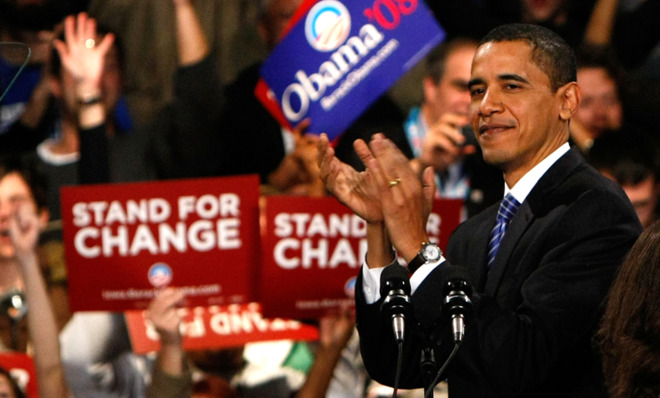Why the best 2016 candidate might be the 2008 version of Obama
Voters hate Washington and want a fresh-faced outsider to fix it. Sound familiar?


A free daily email with the biggest news stories of the day – and the best features from TheWeek.com
You are now subscribed
Your newsletter sign-up was successful
President Obama swept to the White House in 2008 behind a message of hope and change. Washington was broken, and he said he was the key to fixing it.
Coming amid an economic crisis, and after eight long years of George W. Bush, the message resonated with voters. Yet one year into Obama's second term, the national political climate remains strikingly similar to that of 2008.
With Congress likely headed for another year of do-nothing dysfunction, the dour mood is unlikely to change in the near future. And if voters' views don't markedly turn around, that could mean a candidate styled in the mold of Obama would be quite formidable come 2016.
The Week
Escape your echo chamber. Get the facts behind the news, plus analysis from multiple perspectives.

Sign up for The Week's Free Newsletters
From our morning news briefing to a weekly Good News Newsletter, get the best of The Week delivered directly to your inbox.
From our morning news briefing to a weekly Good News Newsletter, get the best of The Week delivered directly to your inbox.
Right around the 2008 election, Gallup found that a record-low 7 percent of Americans believed the country was headed in the right direction. After Obama won, that number spiked to nearly 30 percent — an admittedly low number, but still a vast improvement.
But that figure soon dipped, and though it rose slightly ahead of the 2012 election, it once again headed south. Fully three quarters of Americans are now dissatisfied with the direction the country is headed in.
The government shutdown only exacerbated that sentiment. While Republicans took the biggest hit, with the party's approval rating sliding to an all-time low, Congressional Democrats and Obama also saw their standing erode.
It's no surprise then that polls have found that a record-high number of Americans want to see most members of Congress get booted from office; that voters trust members of Congress less than they do car salesmen and lawyers; and that voters hold Congress in lower regard than they do cockroaches, hemorrhoids, and dog turds.
A free daily email with the biggest news stories of the day – and the best features from TheWeek.com
The president's own approval rating is as low as it's ever been. Even liberals, though they still back the president overall, have dramatically soured on him over the course of the year.
Ironically, voters' worsening impression of Obama may make them more receptive to the kind of message Obama championed in 2008.
That's why New Jersey Gov. Chris Christie appeals to a bipartisan group of voters — a recent poll found that even Democrats had a net favorable impression of him. Christie likes to talk about how the government is broken, and how he cut through New Jersey's partisan gridlock to make big changes in the Garden State. And in his new role as the head of the Republican Governors' Association, he and his fellow GOP governors are already sharpening an outsider message.
"Our frustration is the Washington brand, not the Republican brand," Oklahoma Gov. Mary Fallin (R) said last month.
The desire for a true outsider also explains in part the fevered speculation that Sen. Elizabeth Warren (D-Mass.) might run for president on the Democratic side, even though she herself has said she has no interest in running.
By the same token, it helps explain why Hillary Clinton, the ne plus ultra of Washington insiders, has taken to bemoaning the lack of comity in the capital. As Philip Rucker at The Washington Post wrote in October, Hillary and Bill Clinton have made partisan gridlock a theme of their speeches, "signaling a potential 2016 campaign theme if Hillary Clinton chooses to run for president."
In the 2008 Democratic primaries, Hillary Clinton dismissed Obama’s message of post-partisanship as woefully naïve. But since stepping down as Obama’s secretary of state earlier this year, she has adopted a similar theme, repeatedly berating lawmakers for choosing "scorched earth over common ground."
"We are careening from crisis to crisis instead of having a plan, bringing people to that plan, focusing on common-sense solutions and being relentless in driving toward them," Clinton said last week during at a Center for American Progress gala. [The Washington Post]
She then said, "There's not a liberal America and a conservative America; there's the United States of America." Just kidding. But you get the drift.
Of course, it's standard fare for presidential candidates to promise to change the tone in Washington, and to plead for bipartisan compromise. But it is also evidence that the anti-Washington message is as potent now as it was in 2008.
Jon Terbush is an associate editor at TheWeek.com covering politics, sports, and other things he finds interesting. He has previously written for Talking Points Memo, Raw Story, and Business Insider.
